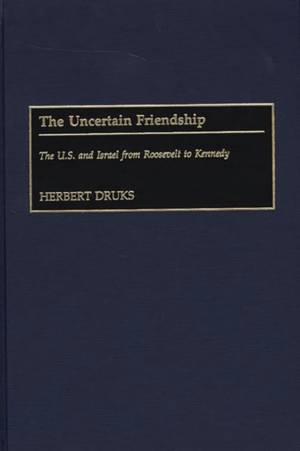
- Afhalen na 1 uur in een winkel met voorraad
- Gratis thuislevering in België vanaf € 30
- Ruim aanbod met 7 miljoen producten
- Afhalen na 1 uur in een winkel met voorraad
- Gratis thuislevering in België vanaf € 30
- Ruim aanbod met 7 miljoen producten
Omschrijving
Although the United States has been a friend to Israel from the beginning and Israel has in return been an important American ally in the region, relations between the two nations have never been without difficulties. This study traces U.S.-Israeli relations from the 1930s to the early 1960s and examines the roles played by both Israelis and Americans in the formation of an independent Israel. Taking into account economic, political, social, and military factors, Druks devotes particular attention to elements of Israel's dependence on and independence from the United States during crucial phases of relations. These include the Holocaust and the failure to rescue European Jewry; Roosevelt and the promise of independence; establishment and recognition; Washington's ongoing relations with the new nation; the 1956 Sinai War; and President John F. Kennedy's enlightened approach towards Israel and the Middle East.
On the U.S. side, Druks analyzes the defining roles played by the various presidents involved, the efforts of Congress, the influence of the media, and the contributions of Americans in general. Discussion of the Israeli side of the equation includes the impact of Israeli leaders, society, and the parliamentary democratic process. The work is based on materials from public and private archives in the U.S. and Israel, published governmental documents, as well as personal diaries. In addition, the author includes interviews with such key figures as Harry S Truman, W. Averell Harriman, Roger P. Davies, Yitzhak Rabin, Benjamin Netanyahu, Yitzhak Shamir Moti Gur, Moshe Arens, and Ezer Weizman.Specificaties
Betrokkenen
- Auteur(s):
- Uitgeverij:
Inhoud
- Aantal bladzijden:
- 272
- Taal:
- Engels
- Reeks:
- Reeksnummer:
- nr. 80
Eigenschappen
- Productcode (EAN):
- 9780313314230
- Verschijningsdatum:
- 30/11/2000
- Uitvoering:
- Hardcover
- Formaat:
- Genaaid
- Afmetingen:
- 162 mm x 241 mm
- Gewicht:
- 603 g

Alleen bij Standaard Boekhandel
Beoordelingen
We publiceren alleen reviews die voldoen aan de voorwaarden voor reviews. Bekijk onze voorwaarden voor reviews.













